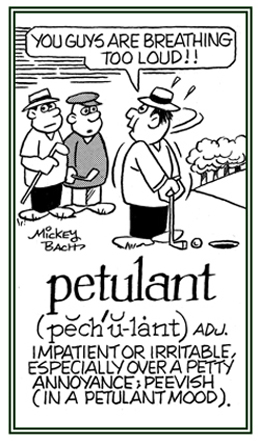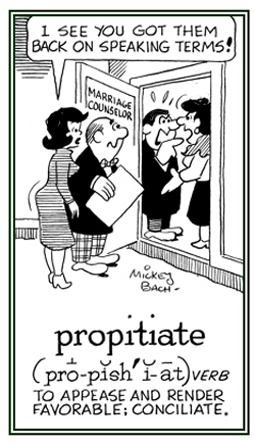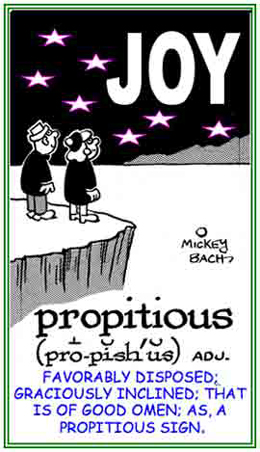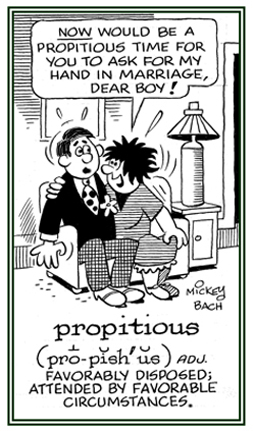peti-, pet-, -pit-
(Latin: to aim at, aim for, go toward; to seek, seek out, ask, request; strive after)
1. Someone who causes something to continue indefinitely or to make it perpetual.
2. Anyone who prolongs the existence of someone or something or causes him, her, or it to be remembered.
2. Anyone who prolongs the existence of someone or something or causes him, her, or it to be remembered.
perpetuity, in perpetuity
1. Time without end; eternity or the rest of time which is an endless or indefinitely long duration or existence.
2. An annuity payable indefinitely or an investment designed to pay an annual return indefinitely, having no maturity date.
3. A situation in which something or someone is being in perpetuity; such as, to desire happiness in perpetuity.
4. A continued, uninterrupted existence, or a duration for an indefinite period of time; such as, the perpetuity of laws and institutions; the perpetuity of fame.
2. An annuity payable indefinitely or an investment designed to pay an annual return indefinitely, having no maturity date.
3. A situation in which something or someone is being in perpetuity; such as, to desire happiness in perpetuity.
4. A continued, uninterrupted existence, or a duration for an indefinite period of time; such as, the perpetuity of laws and institutions; the perpetuity of fame.
1. A formal message requesting something that is submitted to an authority or a written request signed by many people demanding a specific action from an authority or government.
2. A reverent petition to a deity or an appeal or request to a higher authority or Being.
3. A request formally made in writing including something requested or appealed for.
4. Etymology: "a supplication" or "prayer"; especially, to a deity"; from Old French peticiun which came from Latin petitionem, petitio, "a request, a solicitation"; from petere, "to require, to seek, to go forward".
2. A reverent petition to a deity or an appeal or request to a higher authority or Being.
3. A request formally made in writing including something requested or appealed for.
4. Etymology: "a supplication" or "prayer"; especially, to a deity"; from Old French peticiun which came from Latin petitionem, petitio, "a request, a solicitation"; from petere, "to require, to seek, to go forward".
The Latin word petere "to seek", from which petition is derived, is also the source of the English words which appear in this unit.
petition (noun), petitions; petitioned; petitioning
1. To give or address a petition to someone; especially, a person in authority or a representative of an organization.
2. To urge for or against a course of action by presenting a formal request.
2. To urge for or against a course of action by presenting a formal request.
1. Someone who organizes or signs a petition asking a person in authority to do something.
2. A person who gives a court an official document in which he or she asks it to take legal action.
3. A formally written request, typically one signed by many people, appealing to an authority regarding a particular cause.
2. A person who gives a court an official document in which he or she asks it to take legal action.
3. A formally written request, typically one signed by many people, appealing to an authority regarding a particular cause.
1. Ill-tempered or sulky in a peevish manner (easily irritated or annoyed).
2. Unreasonably irritable or ill-tempered.
3. Contemptuous in speech or behavior.
2. Unreasonably irritable or ill-tempered.
3. Contemptuous in speech or behavior.
petulant (PECH uh luhnt) (adjective), more petulant, most petulant
1. A reference to being annoyed and behaving in an unreasonable way as when someone cannot get what he or she wants; being irritable and impatient: When Jan doesn't get her way at home, she usually gets very petulant with her parents.
2. Characteristic of being contemptuous in speech or behavior; that is, feeling, expressing, or demonstrating a strong dislike or utter lack of respect for someone or something: When the politician is criticized for not achieving more for his voters, he often responds in a petulant or snappish way.

© ALL rights are reserved.

© ALL rights are reserved.
Go to this Word A Day Revisited Index
2. Characteristic of being contemptuous in speech or behavior; that is, feeling, expressing, or demonstrating a strong dislike or utter lack of respect for someone or something: When the politician is criticized for not achieving more for his voters, he often responds in a petulant or snappish way.


Go to this Word A Day Revisited Index
so you can see more of Mickey Bach's cartoons.
petulantly (adverb), more petulantly, most petulantly
1. A reference to being easily irritated or annoyed.
2. Showing or inclined to show sudden or unreasonable irritation, impatience, or ill temper; peevish (easily annoyed, ill-tempered) or sulky (in a sullen, bad-tempered mood).
2. Showing or inclined to show sudden or unreasonable irritation, impatience, or ill temper; peevish (easily annoyed, ill-tempered) or sulky (in a sullen, bad-tempered mood).
propitiable (adjective), more propitiable, most propitiable
Able to conciliate or be more favorably inclined; able to gain the good will of; able to appease or make peace with: Lisa's baby girl seemed to be propitiable after she was given a pacifier to quiet her down.
The two families were propitiable after they found a common interest, and that was enjoying some good French wine together in the evening!
propitiate (proh PISH ee ayt") (verb), propitiates; propitiated; propitiating
To make someone who feels offended to be less angry and to get him or her to react in a more friendly way: When Jerome told Sara that he didn't agree with her political view, she responded to his comment by being very loud until he tried to propitiate her by saying that she certainly had a right to her opinion even if it disagreed with his.

© ALL rights are reserved.
Go to this Word A Day Revisited Index

Go to this Word A Day Revisited Index
so you can see more of Mickey Bach's cartoons.
propitiative (adjective), more propitiative, most propitiative
Conveying a tendency to be reconciled or appeasing.
1. Someone who presents favorable circumstances.
2. Anyone who has a favorable tendency or inclination for someone or something.
2. Anyone who has a favorable tendency or inclination for someone or something.
propitiatory (adjective), more propitiatory, most propitiatory
1. A reference to causing reconciliation.
2. Pertaining to winning or to regaining the favor of (a god, spirit , or person) by doing something that pleases each one.
2. Pertaining to winning or to regaining the favor of (a god, spirit , or person) by doing something that pleases each one.
propitious (adjective), more propitious, most propitious
1. Descriptive of circumstances that are promising and opportunistic: Today's weather report is very propitious because Jim must drive quite a distance this afternoon and he doesn't want to worry about the freezing rain on the roads.
2. A reference to some action that is likely to lead to success: Dina thought this would be a propitious time to ask her boss for a raise.
3. Conveying an Inclination to bestow kindness or forgiveness to others: Mariam's father was in a propitious mood during the holiday season and so he was cheerfully giving contributions to several needy people in his neighborhood.
4. Etymology: from Latin, and borrowed directly from Latin propitius, "favorable, gracious, kind"; from pro-, "forward" + petere, "to go toward, to seek out".

© ALL rights are reserved.

© ALL rights are reserved.
Go to this Word A Day Revisited Index
2. A reference to some action that is likely to lead to success: Dina thought this would be a propitious time to ask her boss for a raise.
3. Conveying an Inclination to bestow kindness or forgiveness to others: Mariam's father was in a propitious mood during the holiday season and so he was cheerfully giving contributions to several needy people in his neighborhood.
4. Etymology: from Latin, and borrowed directly from Latin propitius, "favorable, gracious, kind"; from pro-, "forward" + petere, "to go toward, to seek out".


Go to this Word A Day Revisited Index
for a list of additional Mickey Bach illustrations.
A favorable quality of strongly indicating a successful result or a good chance of success.


